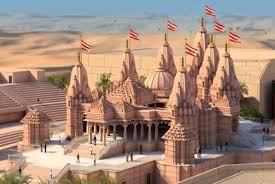What happened to the construction of Pakistan’s first Hindu temple in Islamabad?
On June 24, 2020, foundation for a Hindu Temple was laid in Islamabad, the first for the capital and the first to be built in Pakistan following the 1947 Partition. Prime Minister Imran Khan called it a new start for Pakistan.
The political leadership of the ruling party stated that it will give a positive image of the country that a Hindu temple is being constructed in the capital of Pakistan. Furthermore, it would have helped the country push itself out of the counterterror quagmire, amid the bid to get out of the Financial Action Task Force (FATF) grey-list. Observers lauded it as a positive move for Pakistan in international image building
The prime minister also ordered to provide $1.3million for the temple, which is roughly a fifth of the total budget for the project. Lal Chand Malhi, an MNA, of the ruling Pakistan Tehrik-e-Insaf (PTI) inaugurated the project. “The PM was very happy with the project, as it will give a very positive message to the world about Pakistan,” he said.
The Krishna Temple was given 20,000 square-feet plot in H-9 Sector of Islamabad. The land was allotted to the Hindu community in 2017 and handed over for temple construction in 2018. However, the situation started to change very quickly, when the news of temple construction was aired on the media.
he Islamic clerics started protesting, saying that Pakistan is an Islamic country, and hence a Hindu temple cannot be constructed here. Some locals also went to the site and gave azaan there, saying they will not let a temple be constructed here.
Along with the clerics, media channels openly reported against the construction of this temple. Experts say the hysterical news reports made the situation more hostile.
The government buckled under the pressure of clerics and the media, and not only retracted from providing funds, but also the halted the construction. The government sent the matter to Council of Islamic Ideology (CII) asking whether the temple can be constructed in Islamabad or not.
The Capital Development Authority (CDA) even stopped the Hindu Council from constructing the boundary wall at the site. Giving their reason, the CDA said that the site plan had not been submitted to the institution; hence, the construction cannot continue. This was despite the Hindu Council’s reiteration that it wanted to secure the plot from vandalism.
In the next step, the opposers of the temple submitted a plea in Islamabad High Court against the allotment of the plot. However, in a positive development for the Hindu Council, IHC rejected the plea.
Meanwhile, Pakistan Ulema Council (PUC) announced support for the temple. The Chairman of PUC Maulana Tahir Ashrafi said the council denounces the controversy, as making the temple controversial was not right on part of the extremist clerics. “PUC will call a meeting and present its stance to Council of Islamic Ideology (CII),” he said.
The Ministry of Religious Affairs sent the issue to CII to seek permission. Till the time of writing, no decision has been taken by CII.
Observers say the temple would be a positive development for the image of Pakistan. But the protests and severe opposition from clerics, media, and the masses show deeply-rooted religious extremism in our society, they maintain.
Noting the large scale reaction, observers say that barring a small minority of young progressive voices, who held a demonstration in favour of the temple and launched campaigns on social media, it seemed as though the popular sentiment in Pakistan is against the construction of the temple.
A large number of people argued that they do not want a temple being constructed from the tax money of citizens, because this is an Islamic country. This argument, experts note, completely ignores the fact that minorities also pay taxes and are equal citizens of the country with the constitution allowing them freedom to practice their religions.

